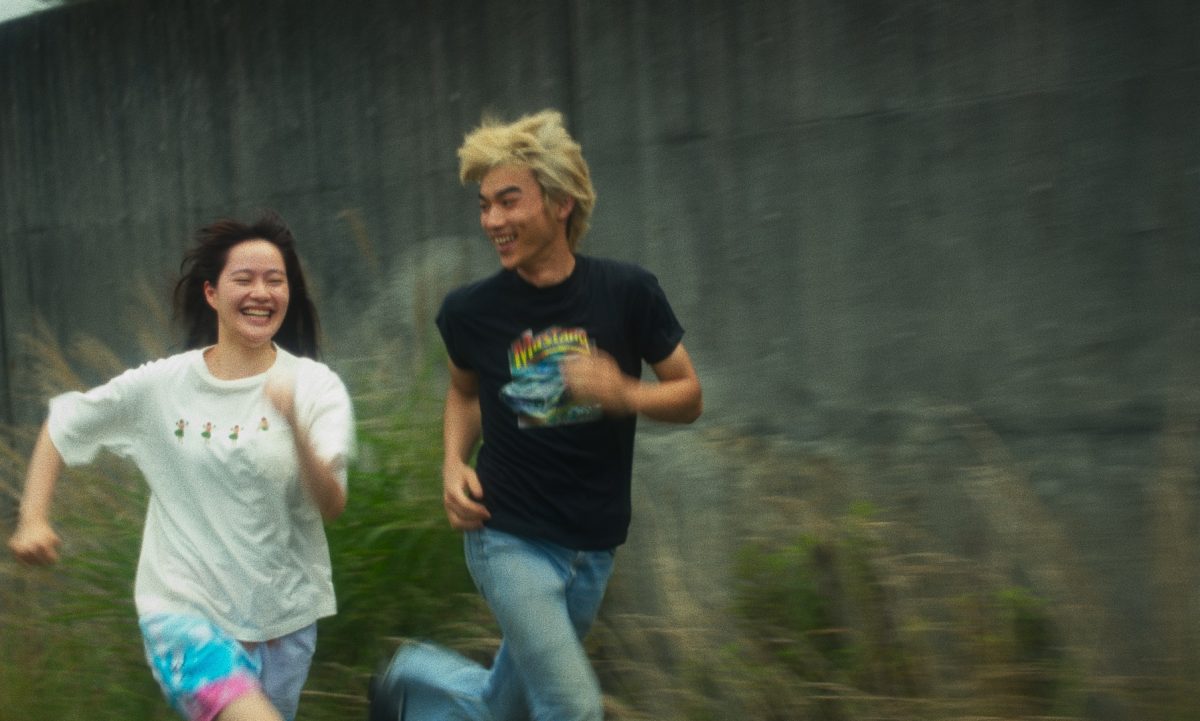Director Daisuke Miyazaki’s “Plastic” opens with a peculiar scene. In a documentary-style talking head interview, an older man and a middle-aged woman — soon revealed as the protagonist’s grandfather and mother, respectively — are interviewed about the 1974 performance of fictional band Exne Kedy at the Isle of Wight rock festival. The man remarks that “surely members of the Beatles were in the audience, members of the Rolling Stones too,” while the woman, a child at the time of the performance, latches onto the particular sensory experience of the day. All she could see were people’s legs, and the music was louder and more intense than anything she had heard before, like music from another universe. What this opener ought to have laid the groundwork for, then, is a film about music and memory — perhaps the subtle and profound ways in which music affects our lives and worldviews.
It is instead a film about nothing.
“Plastic” follows the listless teenage romance between rocker boy Jun (Takuma Fujie) and schoolgirl Ibuki (An Ogawa) in the slow Japanese town of Nagoya from the late 2010s into the early 2020s. Despite their differences — Jun is new in town with little ambition outside playing his guitar, while Ibuki is a Nagoya native with prospects and a desire for certainty — the two bond over a shared love for the ephemeral Exne Kedy. However, much like the band, which mysteriously disappeared after its Isle of Wight festival in 1974, Jun and Ibuki don’t seem destined to last.
More than any well-founded reason as to why Jun and Ibuki aren’t meant to be, what really seems to keep them apart is an almost impressive lack of onscreen energy between the two. The actors stumble through scenes without a hint of chemistry; each plagued with wooden line readings and haphazard shot compositions. Jun and Ibuki never seem like they’re particularly interested in each other, given that their deliveries and blocking never allow them to open up. For example, one of their first scenes is at a cafe where they talk about Exne Kedy over coffee, and the experience is terminally dull. Each shot-reverse-shot composition and silhouette is more or less lifeless — not in a way that communicates an emotional distance between the characters, but rather as unprofessional and poorly planned. Because of this, while the film is ultimately about these two characters going their separate ways, it rings hollow since there’s never a point where they seem to actually connect.
The script isn’t doing the actors any favors either, with each conversation either being about nothing or some trite cliche that a film student would come up with to sound deep. There’s a conversation played out through text messages about the 1974 Arecibo Message, a radio broadcast sent to space as a sort of capsule of humanity, one which won’t meet its potential recipient until at least 25,000 years into the future. While Jun weakly postulates throughout the film that his love life, career or music may be like the Arecibo Message — crying out to the void but knowing no one will hear him for an eternity — there’s never actually any closure on this, just vague posturing whenever the already-languid pacing seems to be screeching to a halt.
Perhaps this could’ve been fixed if the film had bothered to actually utilize its greatest asset: “Strolling Planet ’74,” a faux-live album written by Kensuke Ide for the fictional band Exne Kedy. The album is handsomely produced — rocking guitars, elegant synthesizers and lovely vocal harmonies, similar to a late-era Beatles record, deliver a distinctive and nuanced sound. The album, which is supposed to be the object tying the film together thematically and musically, is severely neglected. When it does come up, it’s by bringing the plot to a halt to play snippets of the first few songs — executed through shots lacking in grace or passion, somehow managing to make veritable hits like “Landline Boogie” and “Madam The Whisperer” lose their spark. However, barring these few scenes, “Strolling Planet ‘74” and music in general have little bearing on the actual themes and plot of “Plastic.”
What makes “Plastic” such an elusive film is that for whatever reason, Miyazaki is incapable of actually grasping onto anything larger than the initial flitters of ideas he must’ve had in the writer’s room. This inevitably causes the audience to suffer as Miyazaki pulls you along through a million little ideas that he wants to include before “Plastic” screeches to a halt, leaving you with nothing. The film wants to be about a romance that can’t last, but never gives you a reason to want it to. The film wants to be about nostalgia and the power of music but seems afraid of playing or showing enough of it to get you attached. It even tries its hand at making some commentary on COVID-19, but can’t even commit to that enough to have its characters wear their masks properly. “Plastic” is almost impressive as an art object because of how it brazenly punishes the viewer for diving in and asking for more, as all they will find is a dozen other, better movies that they’d rather be watching instead. Miss it, instead listen to “Strolling Planet ’74” on Spotify or anywhere else you can stream music.
Contact Max Vetter at [email protected].























































































































































